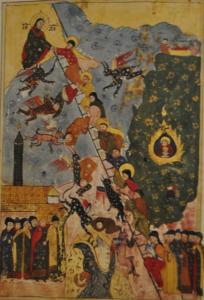
Wisdom is important in our lives; we must be aware of the situations we find ourselves in and deal with them appropriately, making the most of what we have been given. “Look carefully then how you walk, not as unwise men but as wise, making the most of the time, because the days are evil. Therefore do not be foolish, but understand what the will of the Lord is” (Eph. 5:15-17 RSV). There is much evil which goes on around us, evil which often tempts us to join in and embrace it so as to receive all its benefits for ourselves. While there might seem to be some momentary gain if we embrace it, evil in the end is nihilistic and self-destructive; if we engage it and do what it suggests for the good which it promises, we will find that good wanting, and in the end, our lives will be worse for it.
We need to follow the will of God, a will which points to and suggests what will help us the most if we put it into effect. This is because God is not only good, but loves us; God’s will for us is to have us join in and experience what leads to our greater good. But because of the evil which we have done, we might find following God’s will is difficult, for the evil which we do, wounds us, weakening our ability to follow after the good. This is why God offers us grace, so that such wounds, such weakness, can be healed, and through that healing, we can better follow the principles God gives us so as to attain what is good and just. We find a great representation of these principles in Jesus’ beatitudes:
“Blessed are the poor in spirit, for theirs is the kingdom of heaven.
“Blessed are those who mourn, for they shall be comforted.
“Blessed are the meek, for they shall inherit the earth.
“Blessed are those who hunger and thirst for righteousness, for they shall be satisfied.
“Blessed are the merciful, for they shall obtain mercy.
“Blessed are the pure in heart, for they shall see God.
“Blessed are the peacemakers, for they shall be called sons of God.
“Blessed are those who are persecuted for righteousness’ sake, for theirs is the kingdom of heaven.
“Blessed are you when men revile you and persecute you and utter all kinds of evil against you falsely on my account. Rejoice and be glad, for your reward is great in heaven, for so men persecuted the prophets who were before you” (Matt. 5:3-12 RSV).
God is willing to give us blessings in the middle of the evil which is around us; we are to look for them and embrace them, and when we do so, we should act upon them, engaging the blessings so as to make sure their potential is turned into actuality. This is what true wisdom would have us do. But to embrace them, we must engage prudence, understanding how we engage the principles provided to us will differ from situation to situation. Each person will find themselves in different circumstances in their lives, different evils they have to face and overcome, and so there is no one universal way to engage all those principles. This is why legalism, which tries to universalize particular situations and use them to explain all situations, fails to produce the good which it claims to promote, because legalism does make room for such prudence. Wisdom, therefore, would have us look to the situation we are in and have us find what we can do to make the most of it. We will receive blessings if we live out the beatitudes, but we must remember, there is no one way to live them out. They are principles showing where the blessings are to be found.
Part of the beauty of the Ladder of Divine Ascent by St. John Climacus is the wisdom which lies behind John’s writing is the wisdom of the beatitudes, and therefore wisdom which allows the book, written mostly for the sake of monastics, to be adapted and applied to people in other situations. There is much in it which seems harsh, and indeed, is harsh, which is why we must be careful when reading it, making sure we don’t treat the book as a manual which everyone can and should simply follow. If we go beyond the letter of the text, if we look beyond the monastic discipline, discipline which itself was not meant to be taken universally and applied to all monks but was written for monks in a particular monastery, we are given insight which can help us as we try to live out our faith. John understood this, which is why he indicated sometimes engaging ascetic disciplines, which could make us better, actually make us worse, and can be a source of temptation for us:
You will note that many irritable persons practice vigils, fasting, and stillness. For the devils are trying to suggest to them, under cover of penance and mourning, what is quite likely to increase their passion.[1]
This shows us the wisdom which we need to have in our actions; even engaging various penances, we must make sure we embrace them with the right spirit. So many who engage the faith with legalistic expectations also like to follow the most rigorous ascetic practices, thinking that proves their faith and holiness, but the way they treat others shows how far they are from such holiness. Those who are constantly angry and attacking others often find such strict, rigorous ascetic discipline only enhances their worst characteristics; the more they fast, the less sleep they get, the more irritable they become and the more they take it out on others; they are far from the meek and humble people they should be, and so, despite what they might think, they find themselves further and further away from God due to their rigorous discipline. And the more they let their anger get the best of them, the more they let themselves be enticed to act in ways contrary to charity; this can be seen in the way they treat others. Even the most mild of sins get strong rebukes by them, rebukes which are full of anger and malice; embracing that malice, they show themselves far from the love which they are meant to possess, and so far from God. John, having encountered such people in his life, said that they prove to be foolish, for they let themselves be tricked into doing worse sins than those which they rebuke:
Angry people, because of their self-esteem, make a pitiable sigh, though they do not realize this themselves. They get angry and then, when thwarted, they become furious. It was amazing to see one fall punished by another and I was full of pity for them as I saw them taking revenge on sin by sin. The trickery of devils frightened me and I came close to despair for my own life. [2]
Pity, compassion, love, encouragement, these and other such qualities are what help attract people to what is good and true. The fact that so many so-called holy people do not understand this and so act contrary to such charity shows how evil can corrupt and destroy people through the semblance of the good. What happens is that many people use the good they do, the good which they want to embrace, as a way to prop themselves up, to become vainglorious or prideful, and then in and through such a deadly sin, they excuse their own sins, justifying themselves and what they do because of the good which they believe themselves to already possess. This is one of the worst tricks of evil, having people justify their own evil, their own lack of charity, through some semblance of the good, saying that anyone who contradicts them must stand against the good. Charity is necessary for us to overcome the nihilism inherent in evil itself. For, it must be clear, “A loving man banishes revenge, but a man brooding on his hatred stores upon troublesome labors for himself.” [3] And so, we must embrace love, engaging others in charity, not letting anger get the best of us, as John indicated:
Remembrance of wrongs comes as the final point of anger. It is a keeper of sins. It hates a just way of life. It is the ruin of virtues, the poison of the soul, a worm in the mind. It is the same of prayer, a cutting off of supplication, a turning away from love, a nail piercing the soul. It is a pleasureless feeling cherished in the sweetness of bitterness. It is a never-ending sin, an unsleeping wrong, rancor by the hour. A dark and loathsome passion, it comes to be but has no offspring, so that one need not say too much about it. [4]
This is the kind of wisdom which we can find in The Ladder if we look for it, and this is the kind of wisdom which is invaluable for all, not just monks. We must make sure our praxis is one which points to and promotes the greater good, recognizing that what can help some is not going to help others (but might actually harm them if they engage disciplines which go against their actual needs). John, to be sure, wrote a very strict manual for monks under his charge, and this is why many, reading the Ladder, might not understand its value. This is why, if we are to read it, we are to look for John’s greater wisdom, for the insight which he offers which lays behind the discipline which he promoted. For this is where the text proves its spiritual value and why it has been remembered for generations as a spiritual classic.
[1] St. John Climacus, The Ladder of Divine Ascent. Trans. Colm Luibheid and Norman Russell (New York: Paulist Press, 1982), 149 [Step 8].
[2] St. John Climacus, The Ladder of Divine Ascent, 149 [Step 8].
[3] St. John Climacus, The Ladder of Divine Ascent, 152-3 [Step 9].
[4] St. John Climacus, The Ladder of Divine Ascent, 152 [Step 9].
Stay in touch! Like A Little Bit of Nothing on Facebook.
If you liked what you read, please consider sharing it with your friends and family!













